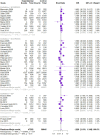Impact of Metabolic Syndrome and It's Components on Prognosis in Patients With Cardiovascular Diseases: A Meta-Analysis
- PMID: 34336959
- PMCID: PMC8319572
- DOI: 10.3389/fcvm.2021.704145
Impact of Metabolic Syndrome and It's Components on Prognosis in Patients With Cardiovascular Diseases: A Meta-Analysis
Abstract
Background: Patients with metabolic syndrome (MetS) have a higher risk of developing cardiovascular diseases (CVD). However, controversy exists about the impact of MetS on the prognosis of patients with CVD. Methods: Pubmed, Cochrane library, and EMBASE databases were searched. Cohort Studies and randomized controlled trials post hoc analyses that evaluated the impact of MetS on prognosis in patients (≥18 years) with CVD were included. Relative risk (RR), hazard rate (HR) and 95% confidence intervals (CIs) were calculated for each individual study by random-effect model. Subgroup analysis and meta-regression analysis was performed to explore the heterogeneity. Results: 55 studies with 16,2450 patients were included. Compared to patients without MetS, the MetS was associated with higher all-cause death [RR, 1.220, 95% CI (1.103 to 1.349), P, 0.000], CV death [RR, 1.360, 95% CI (1.152 to 1.606), P, 0.000], Myocardial Infarction [RR, 1.460, 95% CI (1.242 to 1.716), P, 0.000], stroke [RR, 1.435, 95% CI (1.131 to 1.820), P, 0.000]. Lower high-density lipoproteins (40/50) significantly increased the risk of all-cause death and CV death. Elevated fasting plasma glucose (FPG) (>100 mg/dl) was associated with an increased risk of all-cause death, while a higher body mass index (BMI>25 kg/m2) was related to a reduced risk of all-cause death. Conclusions: MetS increased the risk of cardiovascular-related adverse events among patients with CVD. For MetS components, there was an increased risk in people with low HDL-C and FPG>100 mg/dl. Positive measures should be implemented timely for patients with CVD after the diagnosis of MetS, strengthen the prevention and treatment of hyperglycemia and hyperlipidemia.
Keywords: all-cause death; cardiovascular disease; meta-analysis; metabolic syndrome; prognosis.
Copyright © 2021 Li, Zhai, Zhao, He, Li, Liu, Feng, Li, Huang, Xu and Lyu.
Conflict of interest statement
The authors declare that the research was conducted in the absence of any commercial or financial relationships that could be construed as a potential conflict of interest.
Figures





References
-
- World Health Organization . Global Status Report on Noncommunicable Diseases 2014. World Health Organization. (2014). Available online at: https://apps.who.int/iris/handle/10665 - PubMed
-
- Alberti KG, Eckel RH, rundy SM, Zimmet PZ, Cleeman JI, Donato KA, et al. Harmonizing the metabolic syndrome: a joint interim statement of the international diabetes federation task force on epidemiology and prevention; national heart, lung, and blood institute; american heart association; world heart federation; international atherosclerosis society; and international association for the study of obesity. Circulation. (2009) 120:1640–5. 10.1161/CIRCULATIONAHA.109.192644 - DOI - PubMed
-
- Grundy SM, Cleeman JI, Daniels SR, Donato KA, Eckel RH, Franklin BA, et al. Diagnosis and management of the metabolic syndrome: an American heart association/national heart, lung, and blood institute scientific statement. Circulation. (2005) 112:2735–52. 10.1161/CIRCULATIONAHA.105.169404 - DOI - PubMed
Publication types
LinkOut - more resources
Full Text Sources

